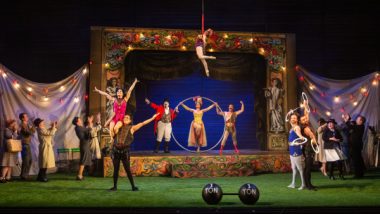 United Kingdom Garsington Opera 2023 [3] – Bedřich Smetana, The Bartered Bride: Soloists, Garsington Opera Chorus & Philharmonia Orchestra / Jac van Steen (conductor). Garsington Opera at Wormsley, 30.6.2023. (CR)
United Kingdom Garsington Opera 2023 [3] – Bedřich Smetana, The Bartered Bride: Soloists, Garsington Opera Chorus & Philharmonia Orchestra / Jac van Steen (conductor). Garsington Opera at Wormsley, 30.6.2023. (CR)

Production:
Director – Rosie Purdie
Original Director – Paul Curran
Designer – Kevin Knight
Lighting designer – Howard Hudson
Choreographer – Darren Royston
Cast:
Mařenka – Pumeza Matshikiza
Jeník – Oliver Johnston
Kecal – David Ireland
Vašek – John Findon
Ludmila – Yvonne Howard
Krušina – William Dazeley
Ringmaster – Jeffrey Lloyd-Roberts
Esmeralda – Isabelle Peters
Mícha – John Savournin
Háta – Louise Winter
Paul Curran’s production of The Bartered Bride was first seen at Garsington in 2019 and many, including myself, widely acclaimed its vivid reimagining of the scenario – closely associated with nineteenth-century Czech nationalism – within 1950s England. Its revival now by Rosie Purdie feels rather more muted and makes me wonder whether such a production for the very particular, occasional circumstances of a summer opera festival, quite stands up to scrutiny this second time around.
A connection between Mařenka’s standing up for herself and her freedom as against the arranged marriage made for her, and the fairly regimented society of the 1950s on the verge of transition and sexual liberation in the next decade is hinted at in Pumeza Matshikiza’s bold, assertive characterisation of the role and warmly projected singing (though she is cool and understated initially). But the other indications of a society undergoing change are less clearly made than they were in 2019, or omitted completely, so that we are left with, simply, an essentially austere setting in a village hall, then a pub without much dramaturgical or critical comment – it’s neither the good old days of Baby Boomers’ nostalgic fantasy, nor exactly a stultifying atmosphere of hierarchy and convention (for all that the clergyman resembles Reverend Timothy Farthing in Dad’s Army).
More pointedly and sardonic is that the valorising of wedlock (implied by the lengths to which not only all four parents of Mařenka and Vašek, and Kecal the marriage broker go to secure a satisfactory marriage which secures their interests, as well as Mařenka and her beloved Jeník’s own attempts to thwart that in their own favour) is seemingly ironised during the villagers’ opening chorus. They lament how wedded life just brings a succession of woe and as the two lovers themselves toil in the kitchen to the side of the village hall to make corned beef sandwiches for the church fair, and Mařenka’s parents later do the same as Kecal goes about securing their daughter’s marriage, it is hardly the prospect for a thrilling wedded life. The circus episode in Act III provides good slapstick humour but does seem like a distraction from what should be a more closely integrated drama among the principal characters, since there is no connection between that spectacle and the settings which have gone before, however well the circus performers present their spectacle here. What is effectively a picaresque presentation, therefore, tends to emphasise the thinness of the drama and libretto, even though Smetana’s music itself is almost unfailingly idiomatic and vibrant, in drawing upon Czech dance and folk traditions.
Jac van Steen conducts the Philharmonia Orchestra in a performance that is solid if, for that reason, just a little too tame or cautious, and doesn’t inject the last degree of fizz and bubbles in the polka and furiant rhythms of many of the opera’s numbers. Like the production, it just falls short of instilling exactly the sense of urgency towards radical change and liberation which the setting is apparently meant to evoke, and which Smetana intended in this allegory of Czech political freedom, although Garsington Opera Chorus bring resounding energy and spirit in the choral sections. The orchestra do achieve a more creditably sustained symphonic lustre in the accompaniment to Jeník’s lyrical, romantic apostrophe to Mařenka towards the end of Act II, and narrative breadth in the extract from ‘Šárka’ (appropriately, the female warrior, from Má vlast) which serves as the interlude at the beginning of that act to enable the scene change to the pub.

Singing in the original Czech, the cast are similarly dependable if not ideally idiosyncratic. Oliver Johnston is a strenuous Jeník, giving a forthright expression of his feelings for Mařenka, though some tenderness would have been welcome. David Ireland is an aptly, comically braying Kecal, as he fumes about money and the contract for the marriage of Mařenka to ‘the son of Tobiáš Michal’. John Findon is rather miscast as Vašek, thought to be the only traceable son answering that description – his well-rounded voice (which slightly smooths over the character’s stuttering) and rather stately gestures don’t capture the role’s effete, weedy inadequacy as a naïve mummy’s boy (think instead of Heinz Zednik’s nuanced charisma in the part for Otto Schenk’s 1980s Vienna production, on record). The two pairs of parents (Krušina and Ludmila, and Mícha and Háta) are fairly anonymous, except for a feisty Háta from Louise Winter.
One comes away from the performance, glad of a summer evening’s entertainment, but not sated with a rich dramatic feast.
Curtis Rogers
